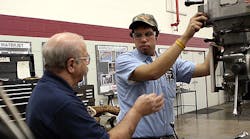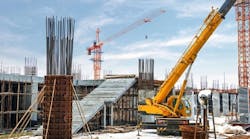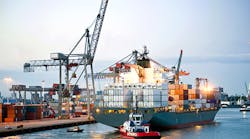With record high oil and energy prices squeezing the economy at all levels on the heels of some of the worst business years ever for the metalcasting industry, the business climate for foundries has been challenging. According to the U.S. International Trade Commission (ITC) report on the state of the industry released in late May, these factors and competition from cheaper foreign sources caused nearly 40% of U.S. foundries to report operating losses in 2003, an increase of 21% from 1999.
Despite this situation, the industry has held on, and even managed to increase its productivity over the past two years. The study found that foundries are offering more value-added services than the they were prior to 2003, including engineering and design services with much shorter lead times for lean manufacturing. While everyone deserves praise for surviving, we are in danger of missing what lies ahead. We need to continue to invest in process improvements and we need to do it with technologies that are cleaner than the ones they replace.
The goals of making more money and doing it through cleaner, more efficient foundry processes are not out of reach — nor are they impossible to achieve. There is public funding available for foundries willing to venture beyond the status quo of environmental control systems. Right now, the U.S. EPA, Deptartments of Energy and Defense, and states with heavy concentrations of industrial activity, are working actively with metalcasting companies to reduce their air, water, and solid-waste pollution streams. Certainly, it is neither feasible nor cost effective to replace existing systems every time a cleaner, more environmentally-friendly process is developed, but as an industry we must start thinking about environmental issues in a different way.
Though the metalcasting industry still perceives a higher level of risk on many new foundry technologies, in many cases (such as with organic sand binders), these products offer equal, if not better, performance than petroleum-based products with fewer environmental and health risks. From a management standpoint, it’s time to ask how much a “wait and see” attitude is really costing. If a few small changes can save your foundry money by creating process improvement — and at the same time reduce scrap, energy consumption and environmental compliance costs — there is a strong, business-focused case for considering it.
By some reports, the cost of petroleum-based binders has risen nearly 30% over the last six months. With the additional hit to domestic oil production and natural gas supplies after Hurricanes Katrina and Rita, one can imagine that this will not improve in the short term, if ever. If we assume operating costs will continue to rise, it makes sense to look at ways to reduce energy consumption and use of petroleum based products. Organic sand binders offer an environmental, stable, and renewable advantage, not prone to market fluctuations. Consider the following facts about the cost of oil and energy:
- In 1999, the average monthly industrial price of natural gas was $3.12 per 1,000 cubic feet. By 2003, it was nearly double at $5.78 per 1,000 cubic feet.
- According to the Energy Information Administration, oil prices between 2002-2004 increased 35% (+12.88/barrel), an average of 18% annually. Compared with just one year ago, prices have increased 29%.
Facing the ongoing challenge to run a profitable business, many foundries are too concerned about keeping costs under control, rather than how they can build capacity for the future, innovate, and excel in a global market. The problem is we do need to worry. The ITC report confirms what we already know — that the reason the industry survived, and what sets U.S. foundries apart from the world, is the quality and innovation that we bring to the table.
Though the American foundry industry may not be thinking about this right now, you can bet foundries in other parts of the world are. Take this as a call to action — if we’ve learned anything in the last few years, it’s that we can’t keep doing business as usual.
Greg Sanders is responsible for Engineering Sales and Technical Support with Hormel GMBOND® and is the director of Technical Services for Entelechy Inc., a consulting firm that helps foundries reduce costs and develop effective processes. He was the National Sales Manager with FATA Aluminum, and also a senior project engineer at the General Motors Technical Center Advanced Engineering Staff, Metal Casting Laboratory.








